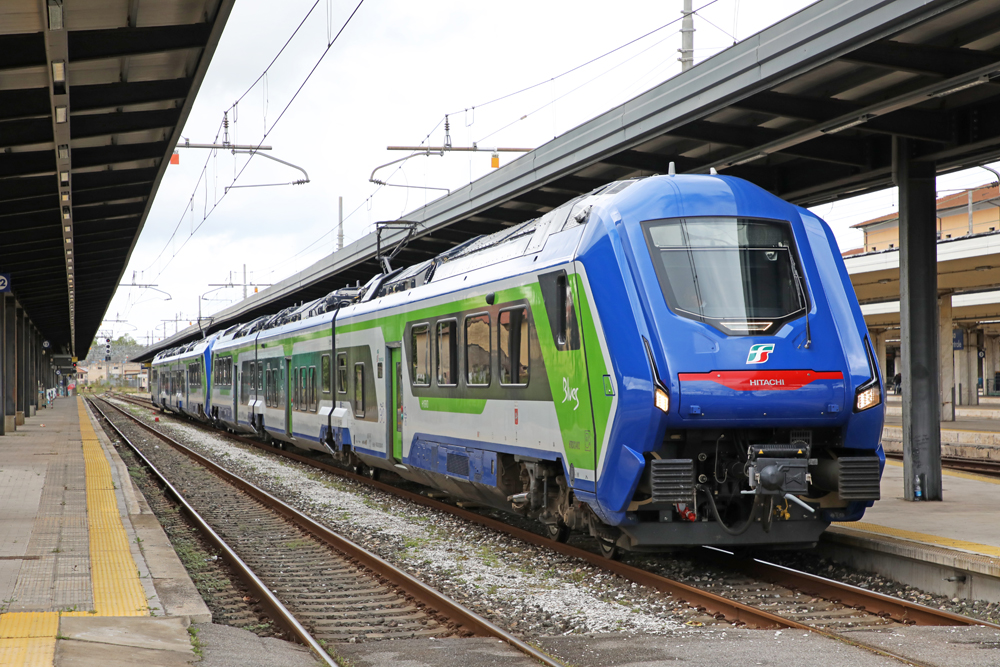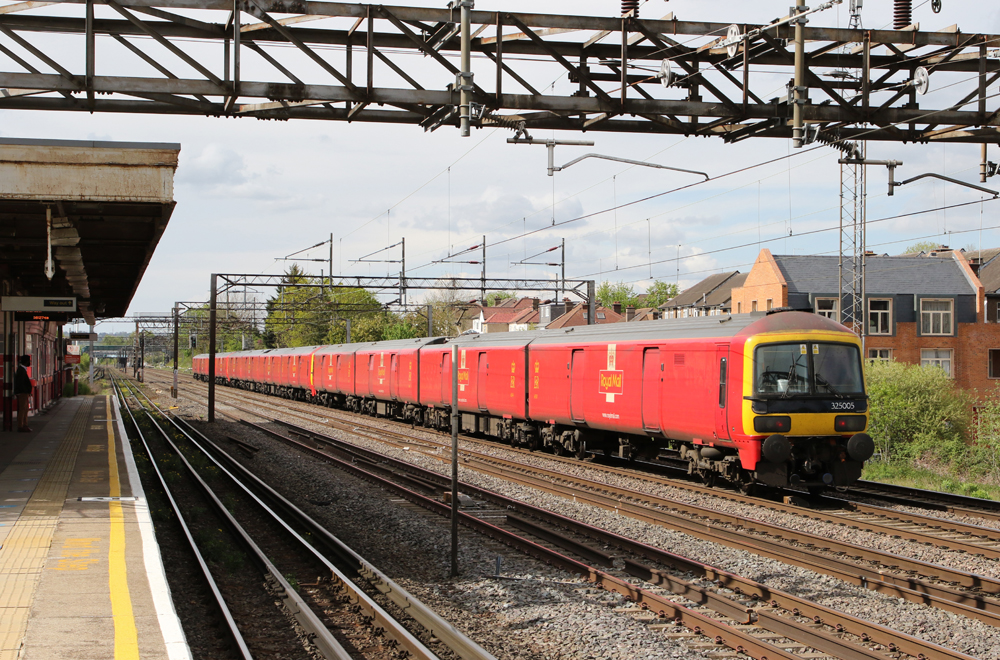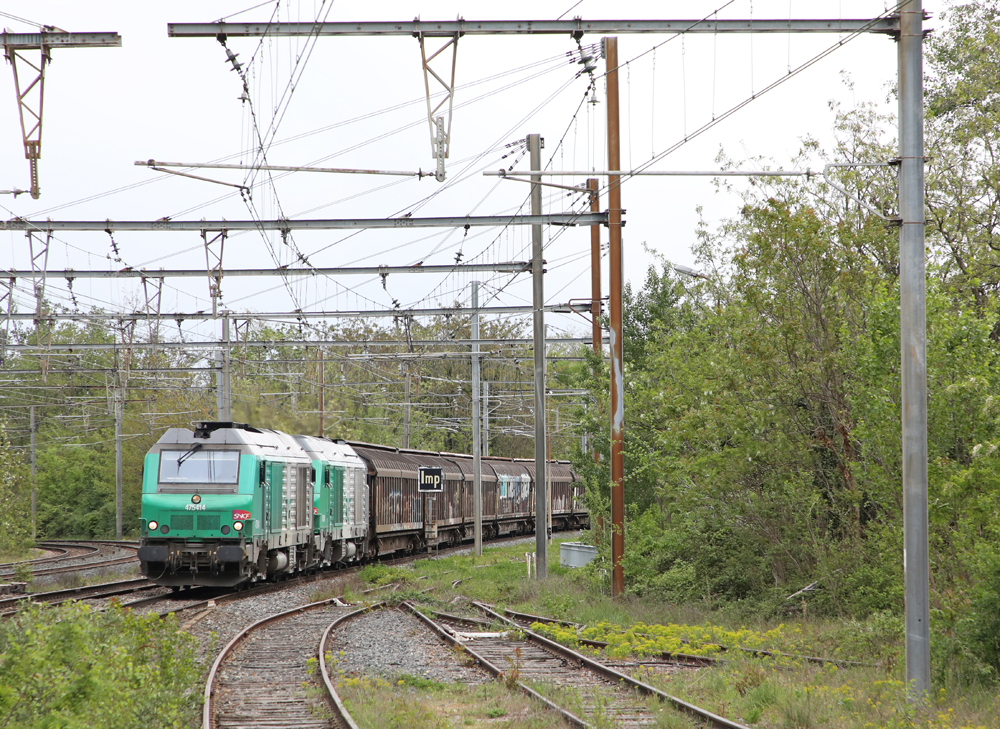International railroad news in 2024 saw the end of commercial steam operation in China and a threat to the continued use of steam on Germany’s premier narrow-gauge steam network. The year also saw new train technology entering service in many countries, with hydrogen and battery power becoming more widespread. In Saudi Arabia an entire metro subway system opened over a few days while in Paris, parts of an ambitious program to expand the famous Paris Metro opened in time for the Olympic Games.
New technology
New technology — especially alternatives to traditional diesel traction, and digital systems using machine learning/artificial intelligence — were the standout themes of the world’s largest rail trade fair, InnoTrans, held in Berlin in September. Both battery- and hydrogen-powered passenger trains were on display, along with locomotives built to use a mix of diesel, battery, and hydrogen power.
Increasing numbers of battery-electric multiple-unit (BEMU) trains — able to operate as regular EMUs under overhead power wires but also from batteries on non-electrified lines (or if the power supply fails on electrified routes) — entered service in several European countries. Stadler-built BEMUs began operation in Germany, and in late 2024 the first of a new design of BEMU built in the Czech Republic by Škoda Transportation started work for Czech national rail operator České Dráhy. In Italy, old diesel trains were replaced in significant numbers by new Hitachi built four-mode (diesel/battery/EMU/diesel+battery) trains, branded by Italian national rail company Trenitalia as “Blues” trains. This continues the company’s musical theme: other modern EMUs in its regional fleet are branded “Pop,” “Rock,” and “Jazz.”
A small fleet of hydrogen-powered trains entered service in late 2024 in the region north of Berlin. These Siemens Mireo units are the last of three fleets of hydrogen powered trains ordered in Germany for regional service; the orders benefitted from a substantial government subsidy program, which has now ended – and no further orders for hydrogen trains have been placed, as BEMU alternatives are less expensive to buy and operate.

Steam in decline
Early in 2024, commercial steam operation ended in China — the last place on earth that steam was in daily use in industrial service. (A small number of steam locomotives remain at mines in Bosnia in Europe, although they are not used every day.) Late in 2024, it emerged that Germany’s famed Harz Mountain steam railway — which runs steam-hauled passenger trains daily — might switch from coal to a new, not yet specified, fuel within the next decade. This would follow feasibility studies to be conducted in 2025].
In Britain, the famous “Harry Potter” steam train – more accurately known as The Jacobite, which runs in the Scottish Highlands — resumed operations after a dispute with rail safety regulators over its passenger cars threatened to disrupt the operation. To further future-proof the operation, the company behind it, West Coast Railways, bought the fleet of another British passenger rail car charter operator. This means it has more cars available for The Jacobite and its other excursion charter operations on the British national rail network.
Change in Europe

Political and regulatory changes impacted rail across Europe. In Britain, a new government elected in July moved quickly to implement an election promise to end the privatization of government-funded contract passenger operators, who operate most British passenger trains. This required a new law, which was passed within a few months. While symbolically touted as re-nationalization, it will not alter the large-scale involvement of private companies in owning and maintaining train fleets. Nor does it impact the several private “open access” passenger rail companies, or rail freight companies. Also in Britain, a nearly 200-year history of mail trains came to an end during 2024 when national postal company Royal Mail withdrew its fleet of dedicated mail-carrying trains, citing the high cost of electric power used to operate the trains and the need for major mid-life overhauls for the fleet By the end of 2024 several of these purpose-built trains delivered from 1995 had been cut up for scrap.
In Europe, the impact of rules created by the European Union to prevent government-owned rail companies from unfairly competing with other rail freight or passenger operators are slowly leading to change. In France, the freight business of national rail company SNCF has been broken up into two new companies; these will start trading as new operator Hexafret and maintenance company Technis on Jan. 1, 2026. Around a third of the previous SNCF freight business is being transferred to competitors on government orders, to avoid the need to pay back around $6 billion in government funding that has been ruled to be illegal under European anti-trust laws. In Germany, DB Cargo, the rail freight arm of national rail company Deutsche Bahn, is facing similar investigations and has started a major restructuring to reduce operating losses.
Tough economic conditions led to major employee layoffs at Poland’s largest rail freight company, PKP Cargo, which is part privatized and listed on the Warsaw Stock Exchange. Several thousand former PKP Cargo employees found new jobs with passenger rail companies, many of which (like rail operators all over Europe) had multiple vacant posts, as many younger people are not attracted to the 24/7 nature of rail operations.

Geopolitics disrupt freight
International conflicts had an impact on rail freight. Attacks on international shipping in the Red Sea by rebels operating from Yemen led many cargo shippers to reconsider using rail for containers from China to Europe via various routes, including transiting Russia. East-West rail freight from China to Europe via Russia had reduced significantly following Russia’s invasion of Ukraine in 2022, but returned to near pre-war levels in 2024 as containers that had switched to sea transport switched back again. Despite significant economic sanctions imposed on Russia by many countries, the use of Russia’s railways for such transit traffic has not been specifically sanctioned. Some of the other sanctions are now impacting the Russian rail system, the key logistics system for the Russian military, with reported shortages of spare parts for locomotives and roller bearings for freight cars leading to disruption and delay to rail freight in particular.
As a result of the sanctions, western train manufacturers have left Russia; the last major company to announce it had done this was Alstom, which in 2024 confirmed it had sold all of its former stake in Russian train building firm Transmashholding to Russian investors, booking a loss of $132 million in the process as a result. In the east of Europe, the national rail freight company in Estonia was privatized for a second time, although its business has reduced to a small fraction of the historic levels, as transit traffic from Russia has ended completely. The fleet of ex-Union Pacific GE C36-7 and Conrail GE C30-7A locomotives imported into Estonia during the first privatization in 2001 is now mostly out of use; several units were scrapped during 2024.
New subways
In Paris, rail transit was used by thousands of spectators attending the Summer Olympic and Paralympic Games, with several new sections of the Paris Metro subway system opening in time for the Games. Elsewhere, a long planned and extensive metro system opened in the Saudi Arabian capital, Riyadh. on Nov. 27, 2024. Saudi King Salman opened three of the systems six lines on one day; two more have subsequently opened, and a sixth is due to begin operation on Jan. 5, 2025. Construction of what is now the world’s longest automatic subway system (at 176 kilometers/110 miles) began in 2014. Both Siemens and Alstom provided train fleets, built in Europe.
Previous News Wire coverage:
European rail freight to see major changes in 2024, Jan. 2, 2024
Conflict in Middle East leads Asia-Europe containers to find new routes, Jan. 20, 2024
Steam operation ends in China, Feb. 17, 2024
Four-mode trains enter service in Europe, April 12, 2024
Scotland’s ‘Harry Potter’ train to restart operations, April 12, 2024
Alstom sells Russian stake and seeks cash injection, May 15, 2024
Former UP and Conrail locomotives in Estonia go to scrap, July 2, 2024
Changes ahead for Britain’s railways after new government elected, July 9, 2024
Britain’s Royal Mail to end rail operations, July 11, 2024
Paris expands rail system in time for the Olympics, July 25, 2024
World’s largest rail exhibition returns: InnoTrans opens in Berlin, Sept. 24, 2024
New locomotives launched at InnoTrans, Sept. 25, 2024
Alternative power, artificial intelligence highlight technological focus of InnoTrans, Oct. 2, 2024
Germany’s premier steam railway to replace steam? Nov. 6, 2024
Source link



